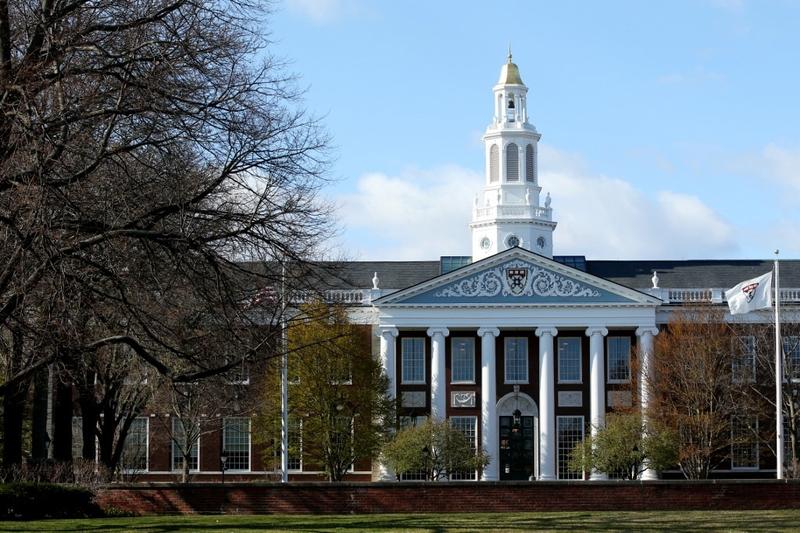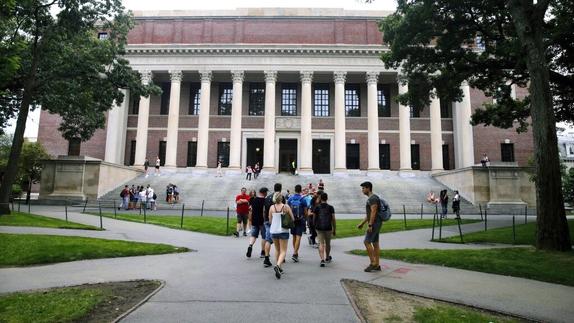 In this file photo a general view of Harvard University campus is seen on April 22, 2020 in Cambridge, Massachusetts. (MADDIE MEYER / GETTY IMAGES NORTH AMERICA / AFP)
In this file photo a general view of Harvard University campus is seen on April 22, 2020 in Cambridge, Massachusetts. (MADDIE MEYER / GETTY IMAGES NORTH AMERICA / AFP)
WASHINGTON - The US government has rescinded a new rule that could have denied international students their stay in the country if they only attend online courses in the coming fall semester, a federal judge in Boston, Massachusetts said Tuesday.
Judge Allison Burroughs, who presided over a hearing Tuesday on a lawsuit filed last week by Harvard University and the Massachusetts Institute of Technology (MIT) against the federal directive, said at the start of the hearing that the government and the universities reached a settlement
Judge Allison Burroughs, who presided over a hearing Tuesday on a lawsuit filed last week by Harvard University and the Massachusetts Institute of Technology (MIT) against the federal directive, said at the start of the hearing that the government and the universities reached a settlement, under which "both the policy directive and the frequently asked questions would not be enforced anyplace."
ALSO READ: Harvard, MIT sue over Trump order on foreign students
"I have been informed by the parties that they have come to a resolution," Burroughs said at US District Court in Boston. "They will return to the status quo."
Announced by the US Immigration and Customs Enforcement (ICE) on July 6 but not yet implemented, the guidance that caused turmoil and triggered outrage in the country's higher education system forced international students to choose between attending at least one in-person class in the fall semester -- transferring to another school if the one they are enrolled in only offers tele-classes due to the coronavirus pandemic -- and leaving the United States as their student visas would be invalidated.
According to the settlement, a March guidance by the ICE will be reinstated, allowing international students to take all their classes online during the pandemic while staying in the United States legally.
Burroughs said the settlement applied to higher education institutions nationwide. The Harvard-MIT lawsuit sought a temporary restraining order and preliminary and permanent injunctive relief to prohibit the ICE from enforcing the July 6 rule.
ALSO READ: US colleges scramble after new Trump order on foreign students
"The motion is mooted," Burroughs declared, referring to the requests by Harvard and the MIT. "The hearing will be adjourned," she said, thanking the lawyers for "making this as easy on the court as it could have been."
Harvard announced last week it will only allow up to 40 percent of undergraduates, including all first-year students, to return to campus for the fall semester. The rest of the students will continue to learn remotely.
Meanwhile, the MIT said last week that seniors will be the only undergraduates to be invited back to campus this fall. Non-seniors may "request special consideration for housing if they face challenges related to safety, living conditions, visa status, or other hardship," the university said in a plan posted on its website.
Harvard and the MIT argued in their lawsuit that the ICE's action considered neither the health of students amid the pandemic, nor the contributions that international students made to American innovation.
They also highlighted the potential loss of "tens of billions of dollars that international students contribute to US GDP each year" should the guidance be put into practice.
ALSO READ: US tells global students to leave if universities go online-only
The number of international students studying in the United States reached 1.1 million in the 2018-19 academic year, making up 5.5 percent of the total US higher education population, according to the Institute of International Education, a New York-based non-profit.
International students contributed nearly US$45 billion to the US economy in 2018, data from the US Department of Commerce showed.
Tuesday's hearing came against the backdrop of 17 states and the District of Columbia on Monday sued the Trump administration over the controversial guidance.
The lawsuit, led by Massachusetts Attorney General Maura Healey, accused the federal government of engaging in a "cruel, abrupt, and unlawful action to expel international students amidst the pandemic that has wrought death and disruption across the United States."
 In this Aug 13, 2019 file photo, students walk near the Widener Library in Harvard Yard at Harvard University in Cambridge, Massachusetts. (CHARLES KRUPA / AP)
In this Aug 13, 2019 file photo, students walk near the Widener Library in Harvard Yard at Harvard University in Cambridge, Massachusetts. (CHARLES KRUPA / AP)
Also on Monday, a group of 20 universities in the Western United States, including Stanford University, the University of Southern California, the University of Oregon and the California Institute of Technology, filed a lawsuit challenging the ICE's guidance.
The schools complained that their plans for the upcoming semester "were thrown into disarray" by the ICE's "about-face" policy change, which was announced "without warning and without any input from the schools or students directly affected by it."
On Sunday, a coalition of 59 colleges and universities, including Georgetown, Princeton, Stanford and Yale, filed an amicus brief to the Boston federal court in support of the litigation effort by Harvard and the MIT. The schools collectively enroll more than 213,000 international students every year, according to the brief.
Meanwhile in the business community, tech giants including Google, Facebook and Twitter also stood by Harvard and the MIT, saying the new directive will harm their businesses. "America's future competitiveness depends on attracting and retaining talented international students," the companies said in court filings.
READ MORE: Trump order temporarily limits US immigration during virus crisis
In addition, a group known as the Presidents' Alliance on Higher Education and Immigration formed by 180 colleges issued a statement last Friday, saying the ICE's revised mandate "blindsided the whole of higher education."
"The COVID-19 emergency no doubt continues. Recent data indicates that there are more new infections at present on a daily basis than in March -- when ICE stated that its guidance would last 'for the duration of the emergency,'" the group said in its amicus brief.
"All seem to agree the emergency remains ongoing, but ICE's policy has inexplicably changed," read the brief.


